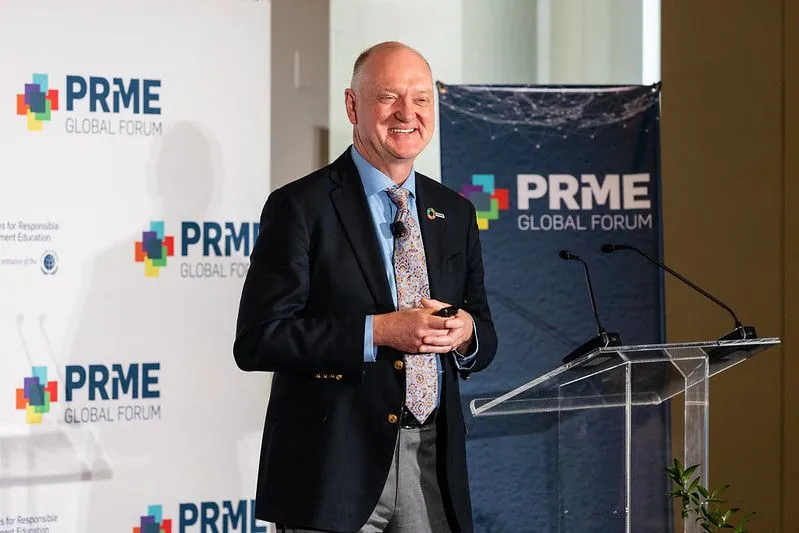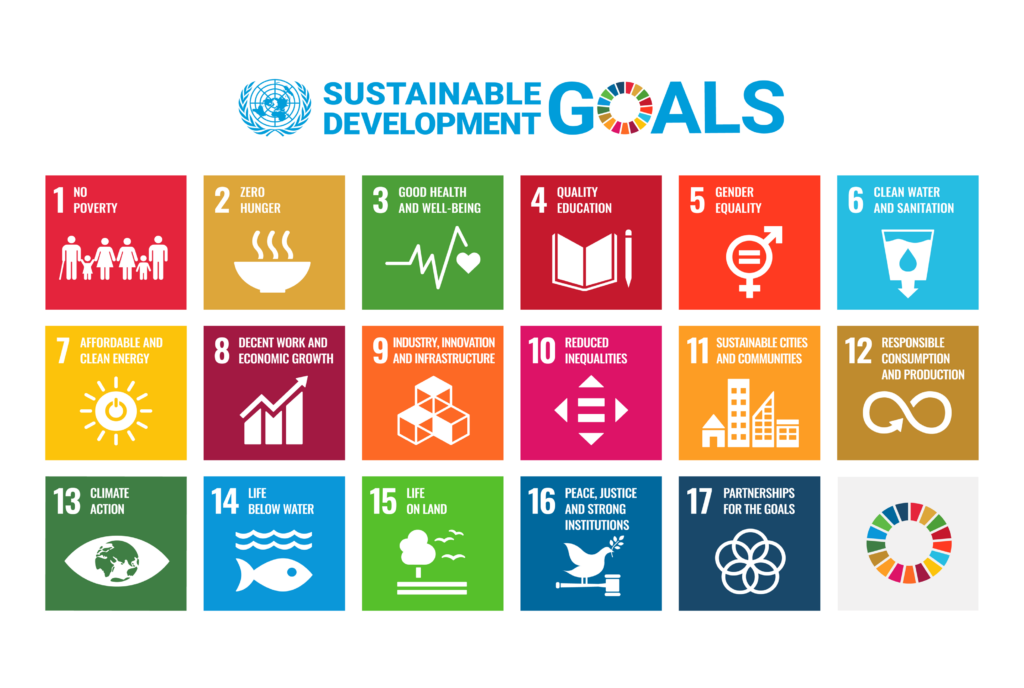
Andrew Karolyi, dean of Cornell SC Johnson College of Business, was elevated to vice chair of the PRME Advisory Board at the 2023 Global Forum. Today PRME launches a digital database of sustainability resources for its 800-plus member business schools around the world. (C) PRME / Joel S Photo LLC
Across the world, about a third of all higher-education degrees each year are in business management, law and economics. That’s millions of students each year, some of whom will become decision-level leaders. Whether they change how business is done or continue business as usual depends a lot on what they learn in B-school classrooms.
That’s a huge responsibility — especially for those who believe the private sector can and should be a source for good in a world facing monumental challenges like climate change and social and economic inequality.
The United Nations-supported Principles for Responsible Management Education (PRME) was created to better incorporate responsible management practices in B-school classrooms around the world. Today (March 28) it launches a new tool to help fulfill its mission: The PRME Commons, a digital platform for B-schools to more easily share their teaching, research, and best practices on sustainability topics.
TRACKABLE, SEARCHABLE DATA ACROSS 800 B-SCHOOLS
PRME, which launched in 2007, now has more than 800 signatory management schools from around the world organized into 17 regional chapters. The North American chapter, for example, has nearly 140 business schools, including Cornell SC Johnson College of Business, UC Berkeley Haas School of Business, Ivey Business School at Western University, and University of Toronto’s Rotman School of Management.
Each signatory pledges to advance PRME’s seven core principles. In return, they get access to its network of sustainability leaders. PRME’s principles are:
- Purpose: Advance responsible management education to foster inclusive prosperity in a world of thriving ecosystems.
- Values: Place organizational responsibility and accountability to society and the planet at the core of what we do.
- Teach: Transform learning environments by integrating responsible management concepts and practices into curriculum and pedagogy.
- Research: Study people, organizations, institutions, and the state of the world to inspire responsible management and education practice.
- Partner: Engage people from business, government, civil society, and academia to advance responsible and accountable management education and practice.
- Practice: Adopt responsible and accountable management principles in our own governance and operations.
- Share. Share successes and failures with each other to enable our collective learning and best live our common values and purpose.
“Distancing itself from the competitive frameworks that often foster competition and rank business schools, PRME seeks to cultivate a culture of shared growth and mutual learning,” reads a PRME press release. “This ethos underscores the belief that achieving sustainable development is a shared mission, transcending individual institutional achievements in favor of collective progress.”

Source: un.org
‘THESE ARE THE TIES THAT BIND’
Each year, signatories create “Sharing Information on Progress” reports on how their research, pedagogy, skills and curricula align with these principles. Previously, school SIP reports were collected as PDFs, a clunky way to track and find information.
PRME Commons digitizes these reports making them much more user-friendly. It has also updated its SIP process through dynamic reporting to streamline the process while encouraging the exchange of knowledge and best practices among members. PRME Commons will serve as a self-reporting database for schools to better track and enhance their sustainability goals.
The reports themselves have been modernized. The new SIP will include a questionnaire on each school’s commitment to the principles, and will allow schools to use policy documents, videos, event summaries and other multimedia content to provide a deeper view into how the principles are being executed.
“PRME’s Sharing Information on Progress reporting is a vital component of what it means to be a Signatory to the Principles of Purpose, Values, Teach, Research, Partnership, Practice, and Sharing,” says Andrew Karolyi, dean of Cornell SC Johnson College of Business and vice-chair of the PRME Advisory Board.
“These are the ties that bind our wonderful PRME community in the pursuit of business education for a better world. In easing the exchange of knowledge, the new PRME Commons will only help to amplify and leverage the best of teaching, learning and research for our community.”
THE UN’S 17 SUSTAINABLE DEVELOPMENT GOALS
At its core, PRME is a sharing and learning platform for its signatory schools. It is also a collaboration network, not just for business schools, but for accrediting bodies, research organizations, business networks and others working together to mobilize a sustainable agenda.
Its origins date all the way back to 2000 when the United Nations launched its Global Compact under the leadership of then Secretary-General Kofi Annan. The compact was a public recognition that governments alone cannot solve the world’s most pressing problems. The private sector is a large contributor to challenges surrounding human and labor rights, climate and environment, extreme poverty and more, and the private sector must be part of the solutions.
The compact calls on businesses and organizations across the globe to voluntarily align their strategies to advance the UN’s 17 Sustainable Development Goals (SDGs) adopted in 2015. These range from eliminating hunger to ensuring access to affordable and clean energy.
The UN Global Compact began the PRME initiative in 2007. Acknowledging the pivotal role education plays in shaping future leaders, PRME aims to instill a sense of responsibility in the curricula and culture of management schools.
To learn more about PRME or to become a signatory school, go to unprme.org.
DON’T MISS: PRME, NETWORK OF SUSTAINABILITY-FOCUSED BUSINESS SCHOOLS, PRIMED FOR NEXT CHAPTER AND AT MICHIGAN ROSS, THE WORLD IS A SUSTAINABILITY CLASSROOM











Questions about this article? Email us or leave a comment below.